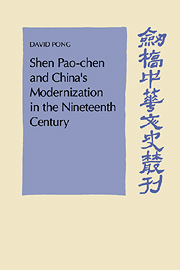Book contents
- Frontmatter
- Contents
- List of maps, tables, and figure
- Acknowledgements
- A note on spelling
- Abbreviations used in the notes
- Introduction
- 1 Early years
- 2 Local official in Kiangsi, 1856–1859
- 3 Governor of Kiangsi, 1862–1865
- 4 First encounters with foreigners
- 5 Director-general of the Foochow Navy Yard
- 6 The Foochow Navy Yard: early developments, 1866—1867
- 7 The Foochow Navy Yard: administration and personnel
- 8 The Foochow Navy Yard: building and training programmes
- 9 The Foochow Navy Yard: financial crises
- 10 The next steps in defence modernization: Ma-wei and beyond
- 11 Towards a plan for self-strengthening
- Conclusion
- Glossary of Chinese characters
- Bibliography
- Index
11 - Towards a plan for self-strengthening
Published online by Cambridge University Press: 22 September 2009
- Frontmatter
- Contents
- List of maps, tables, and figure
- Acknowledgements
- A note on spelling
- Abbreviations used in the notes
- Introduction
- 1 Early years
- 2 Local official in Kiangsi, 1856–1859
- 3 Governor of Kiangsi, 1862–1865
- 4 First encounters with foreigners
- 5 Director-general of the Foochow Navy Yard
- 6 The Foochow Navy Yard: early developments, 1866—1867
- 7 The Foochow Navy Yard: administration and personnel
- 8 The Foochow Navy Yard: building and training programmes
- 9 The Foochow Navy Yard: financial crises
- 10 The next steps in defence modernization: Ma-wei and beyond
- 11 Towards a plan for self-strengthening
- Conclusion
- Glossary of Chinese characters
- Bibliography
- Index
Summary
This study of Shen Pao-chen has reached a point where we can meaningfully examine his grand scheme for building a stronger China. It has often been said that the Ch'ing Restoration failed because the reformers adopted aspects of Western technology and diplomatic methods (yangwu) only to preserve the traditional order. Therefore, to the extent that modernizers and their enterprises changed the world around them, they did so not so much by design, or even necessity, as by the inexorable seminal nature of the enterprises themselves. The issue is seldom seen from the perspective of those in charge of these undertakings, whose main concern may well have been to modify the outside world in order to make it more supportive of their labours. This chapter shows that Shen's plan for change was driven by this concern.
Shen was not given to discourses on comprehensive plans for change. Not that he was afraid of consequences. As a censor, he had been fearless in his criticism of the government. As the head of the Foochow Navy Yard, he had made numerous proposals for change. His proposals, however, were usually piecemeal, dealing with specific problems or needs as they arose. Indeed, he was known to his colleagues as a ‘doer’ rather than a ‘theorist’. When comparing him with other reformers, Kuo Sungtao spoke of him as the one who ‘can put proposals into operation’.
- Type
- Chapter
- Information
- Publisher: Cambridge University PressPrint publication year: 1994



